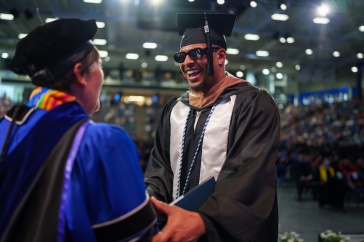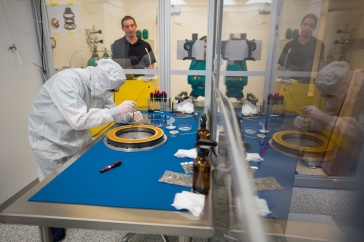
When Michael D’Antonio ’77 was a child, his mother was the town librarian for New Castle, New Hampshire, the island community just off Portsmouth at the mouth of the Piscataqua River. Growing up in a town with no restaurants and only a small general store, D’Antonio spent a lot of time at the library and read much of what was on the shelves. “It was a tiny collection of books, but to me it was substantial,” he recalls. He also read the newspaper that arrived at the general store daily and later became a delivery boy. “I just kind of fell in love with the window on the world that the paper provided,” he says.
In high school, D’Antonio’s interest in journalism pointed him toward UNH, where he cut his teeth writing for The New Hampshire and studied with the university’s famed journalism program founder, Don Murray. Murray was the first professor he met at UNH, and the figure D’Antonio credits with teaching him to respect his own curiosity and to believe he could make a living at writing. “He made it possible to imagine doing the work yourself even if you had no exposure to craft,” D’Antonio says. “He demystified a lot of it, really described it as work. And I came from a pretty working-class background and was unafraid of hard work. I really thought that was one way to compensate for maybe a lack of worldliness.”
D’Antonio went on from UNH to make a living at writing in a way most can only hope to achieve. He worked as a journalist in Maine, New York and Washington D.C., earning a Pulitzer Prize in 1984 as part of a Newsday team reporting on the medical, legal, and ethical issues surrounding the 1983 Baby Jane Doe case — a New York anti-abortion activist’s attempt to sue doctors to perform surgery on a baby, to whom he was unrelated, who had been born with severe birth defects and whose parents had declined treatment. In 1989, D’Antonio published his first book, “Fall From Grace,”?an examination of the religious “born again” movement and the rise and fall of America’s Christian Right. He’s since authored a dozen additional books and co-authored four more, on wide-ranging and complex topics that include the sexual abuse crisis in the Catholic Church, Cold War-era eugenics experiments at a Massachusetts state school, professional golf, yachting, baseball, chocolate magnate Milton Hershey and the U.S./Soviet space race.
In recent years, D’Antonio has turned his attention to politics, taking on the most towering figures in the American political landscape with the same equitable intelligence he brought to his earlier subjects. He published “Never Enough: Donald Trump and the Pursuit of Success” in 2015 and “A Consequential President: The Legacy of Barack Obama” at the beginning of 2017. Expected in 2018 is what he describes as a “social psychoanalysis” of 2016 Democratic presidential nominee Hillary Rodham Clinton.
“The interesting thing about it is, it’s been such a long process for me,” D’Antonio says. “I left UNH in 1977 and spent — wow, now that I think about it — 35 years writing about religion and politics and history and trying to learn a little bit about how the world works, to try to see how the forces of events impact personalities and how those personalities respond to events.”

These days, of course, it would be hard to imagine an individual in whom the American public has more vested interest in how those particular dynamics play out than the 45th president. “Never Enough”?came out of a series of interviews D’Antonio conducted with Donald Trump over the course of 2014, before the New York-based businessman had declared his intention to make a second run at the presidency. Even then, D’Antonio recalls, Trump had an appetite for media coverage that was partly a reflection of the attention he’d garnered as a high-profile real estate investor — and partly a surprisingly savvy political gambit. “He really understood, and still does, the value of press attention,” D’Antonio says. “He’s not the first person to have this understanding, but I think he was the best at cultivating the attention and then knowing how to convert it.”??? ?
For 2017’s “A Consequential President,” D’Antonio didn’t get the same type of inside access to Barack Obama, but instead examined how well the former president kept his promises to make change during his eight years in the White House. “It’s hard for many people to remember how bad it was” when Obama took office, D’Antonio says, noting the Iraq War, the Great Recession and other challenges. Hillary Clinton had been the favored candidate in the primary season, and he thinks Obama probably wouldn’t have been elected in a moment that was less fraught. “This was a crisis period,” he says. “People seemed to be very ready for something radically different.”
“If you look at how people become distorted in office, so much of the trouble that presidents have gotten into over the years could be seen as the product of their isolation in the White House, but also the distortion of reality they experience because they’re not just people, they’re symbols.”
And then there’s Clinton herself, who D’Antonio describes as an icon — a persona she helped to create but that ultimately drove her political downfall. “If you look at the arc of her life and how people responded to her, she was often a stand-in for the anxieties some people felt and the hope that other people felt,” he says. “Really since the 1970s, she was never a full person in the public’s mind — and that’s, I think, in the end what really hurt her, that role of icon, both put on her but also cultivated by her. It’s very hard to sustain that over a long period and to persuade people that underneath all that there’s a genuine human being.”
What has writing about a future president, a former president and a presidential nominee left D’Antonio with? Compassion — and perhaps a need to sound the alarm on what the public does to the people who offer themselves as leaders. “Everyone complains about how public service can destroy a person’s reputation or expose them and their families to unfair treatment, and that those things make politics very unappealing to great swaths of qualified individuals, but I think it’s even more complex and devastating than that,” he says. “If you look at how people become distorted in office, so much of the trouble that presidents have gotten into over the years could be seen as the product of their isolation in the White House, but also the distortion of reality they experience because they’re not just people, they’re symbols.”
In the end, D’Antonio notes, he doesn’t think it serves anybody well to isolate presidents in that kind of bubble. “That’s when citizens start to think that the president doesn’t care about them,” he says. “And I think it’s because they become so distant — not only from the electorate but also from their original selves — that not only do they fail to hear, but they also fail to respond in a way that’s true to the values that may have motivated them in the first place.”
It’s insights like these that have led to the latest incarnation of D’Antonio’s journalistic career. Since 2016, he’s been a regular commentator for CNN, contributing analysis of the current presidental administration and other topics, both on the air and online. Today, home is Long Island, New York, where he writes and lives with wife Toni Raiten-D’Antonio, who is a psychotherapist and professor and an author in her own right. And if that all seems like a long way from New Hampshire’s New Castle and the tiny library where D’Antonio’s desire to learn more about people by writing about them was sparked, it both is and it isn’t.
“Very early on I thought, ‘Well, I would love to spend my life investigating and discovering and sharing what’s going on around me,’” he says. “It just seemed like a wonderful way to keep learning and discovering at every stage of life, and it turned out that that was true.”

?
?
By Tom Kertscher
Illustrations by Roy Scott
?
Originally published in?UNH Magazine Winter?2018?Issue
?
?
Comments
?
Great article. I like how he has focused on politics,?religion and key personalities and how those personalities allowed him to touch on many global issues. I also appreciated his New Castle, NH, roots. I lived in Amherst for six?years — only a general store in the center of the town.
—Mark Dullen ’88
?
Enjoyed the article, at least partly because I believe Mike was a student in my English class at Portsmouth (NH) High School. No surprise that he has achieved such amazing success. I did teach him everything I knew!
—Ann Orlando
?
Exceptionally interesting and informative article about Michael D'Antonio ’77 written by Tom Kertscher! I truly enjoyed it!
—Dennis John Pope ’67
?
Mike, congrats on your great work.
—Tim Burke ’77
?



















































